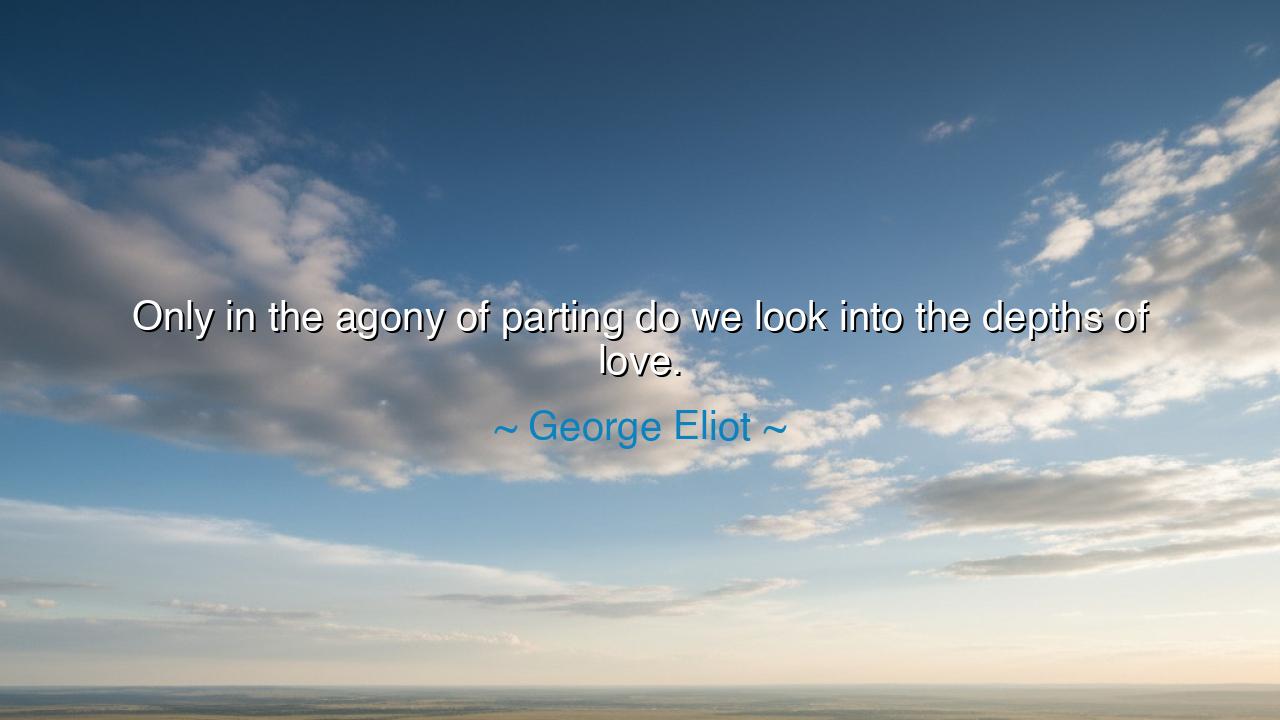
Only in the agony of parting do we look into the depths of love.






"Only in the agony of parting do we look into the depths of love." Thus wrote George Eliot, the wise and tender spirit who gazed deeply into the hearts of men and women and understood their silent sorrows. In this sentence of quiet thunder, she reveals the paradox that has haunted humankind since the dawn of affection—that the true measure of love is often hidden until the moment of its loss. When two souls must part—whether by distance, fate, or death—the veil is lifted, and love is seen not as the soft pleasure of companionship, but as the rooted force that binds one heart to another. Only in its breaking do we see its strength. Only in its absence do we recognize its fullness.
The origin of this wisdom lies in Eliot’s own life and in the world she painted with her words. Born Mary Ann Evans, she lived in an age that confined women’s hearts and minds within narrow walls, yet she dared to live and love beyond them. Her novels—rich with empathy and moral truth—often explored the quiet heroism of the heart: how love endures, falters, and redeems. She had known parting herself—separation from family for her beliefs, and later, the pain of a love that the world scorned. Thus, this quote rises not from theory, but from lived experience—from the agony of the heart that has known both union and loss, and found in both the revelation of love’s depth.
When Eliot writes of “the agony of parting,” she speaks not only of the pain of lovers, but of every bond that ties the soul to another—the parent and child, the friend and companion, the teacher and disciple, even the living and the dead. We move through life surrounded by the familiar presence of those we love, and in that comfort, we often take love as a given. But when the time comes to part, the heart awakens. Suddenly, every shared moment gleams with meaning. Every word left unspoken becomes a prayer. And we realize, too late or just in time, that love was never shallow, never ordinary—it was the deepest river flowing quietly beneath the surface of our days.
Consider the story of Helen Keller and Anne Sullivan, the teacher who led her from darkness into light. Their bond was beyond words—an eternal tether of trust and devotion. When Anne, after years of service, fell ill and passed away, Helen wrote, “I feel that her spirit still walks beside me, leading me.” In that moment of parting, Helen looked into the depths of love and saw its eternal nature. The pain of losing her beloved teacher revealed the immeasurable gift of their connection. Love, she understood, does not end with parting—it is merely revealed in its truest, most luminous form.
Eliot’s wisdom teaches us that love’s depth is not known in joy alone. When life is easy and full, love feels like sunlight—it warms us, but we may not notice its brilliance. It is only when the sun sets, when we walk through shadow, that we understand what it meant to stand in the light. The agony of parting is thus not merely sorrow; it is awakening. It purifies the heart, stripping away the illusions of comfort and leaving only truth. Through grief, love becomes sacred, for it shows us that what we held was not possession, but communion.
Yet this truth need not be a source of despair—it is a call to awareness. If separation reveals love’s depth, then let us strive to see that depth before we lose it. Let us not wait for farewell to awaken gratitude. Speak affection while the ear can still hear it; show kindness while the hand can still feel it. The wise do not hoard love as treasure—they spend it freely, knowing it grows in the giving. To love deeply now is to live without regret later, for when the parting comes, as it must to all, the pain will be tempered by the memory of love fully lived.
So, my listener, carry this teaching into your days: cherish what is before you, honor whom you love, and do not fear the sorrow of goodbye. For that sorrow is not the enemy—it is proof that your heart has known something eternal. Love that leaves no ache was never love at all. Therefore, do not flee the agony of parting; embrace it as the mirror that shows your heart’s true depth. And when the time comes to let go, do so not in despair, but in reverence—for in that moment, as George Eliot teaches, you will behold the sacred truth that love is deeper than parting, and stronger than time itself.






AAdministratorAdministrator
Welcome, honored guests. Please leave a comment, we will respond soon